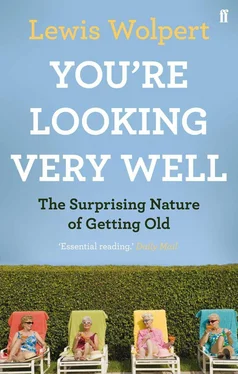* * *
The Big Question: ‘Is the world’s population the wrong age?’ In some countries there are too many old people, while in others the population is very young. While the developed world is facing up to the challenges of an increasing number of elderly citizens, some developing countries are facing the strain of populations in which a third of the people are under the age of 15. Neither situation is ideal, but the challenge is to find ways of adapting to cope with the economic demands of differing population ages.
According to a UK survey, most individuals approaching old age had not yet thought about how they would be cared for. I myself am guilty of this. At least 13 million, according to the government, are not saving enough to retire on a decent income. Some 70,000 people have to sell their homes each year to cover the cost of long term care. When asked about the supposed worries they would have when 75, about half those aged 45 to 75 were rightly worried about money for long-term care. At 65, the government says, a woman can expect to face average care costs of £ 40,400 and a man, who will not live as long, £ 22,300. Those with severe health problems such as disability and Alzheimer’s disease and and other forms of dementia are by law entitled to free NHS care, but ageing illnesses makes self-support increasingly difficult. Plans for nearly half a million needy elderly to remain in their own homes would cost £ 670 million a year, and in current economic circumstances such figures are vulnerable.
The health of the elderly remains a major issue. Health spending on the elderly in the EU is about one third of the total health budget. In the UK more than 40 per cent of the NHS budget is currently spent on people aged over 65. The estimated number of people in the UK living with the effects of stroke, which mostly strikes people over the age of 60, will rise significantly, and the number of people with dementia will increase to around a million in 2025 imposing a major burden on social services and families. The cost of looking after them has been predicted to increase to £ 35 billion. The number living with coronary heart disease, osteoporosis, osteoarthritis and age-related macular degeneration of their sight will all increase dramatically. Treatment of all these illnesses is, to put it mildly, expensive. Currently those over 65 consume one third of all drugs but are only 14 per cent of the population. The NHS will face increasing demand for its services to the old. To go further and increase the quality of services will require an additional 3 or 4 per cent increase each year.
According to the Institute of Medicine report in 2008, the elderly in the US account for more than one third of all hospital stays and of prescriptions, and more than a fourth of all office visits to physicians. The average 75-year-old American has three or more illnesses and takes at least four medications. Delivering optimal geriatric care has become a costly medical and ethical priority. Medical and nursing schools are, it is claimed, training far too few doctors and nurses on how to care for the elderly. At the same time, other workers, such as nurses’ aides and home health workers, remain under-trained and underpaid, the experts say. The number of doctors specialising in geriatrics has been falling. The US government has recently announced a new initiative to assist with housing costs for elderly and disabled people.
Despite the best efforts of any government, the cost of the elderly is going to leave a gap in funding. Spending on care for the elderly will have to double over the next 20 years to cope with a surge in the numbers of sick and disabled old people. It was previously believed that the amount of time that pensioners spent being sick or disabled would remain constant or even shrink with the help of medical advances, but this is unlikely. Instead, many of the extra years will be spent being unwell and in need of care. Increases in the number of years of good health have not kept pace with improvements in total life expectancy. The number of sick elderly people, or those with disabilities, will increase by around two thirds over the next 20 years. The costs are frightening.
Around 700,000 people in the UK spend more than 50 hours a week caring for a relative, according to Carers UK. A lack of facilities means one million family members already take time off work to care for aged or disabled relatives, while another six million take some ad-hoc responsibility for caring. By 2033 the number of people aged 85 and over is projected to more than double again to reach 3.2 million, and to account for 5 per cent of the total population, and so the number of carers needed will have to soar as well. Britain faces a care time-bomb within seven years, with the number of elderly needing full-time help outstripping the number of carers. Free personal care at home is available in Scotland but not in the rest of the UK.
Public transport systems, especially fixed-route bus services, face important challenges in meeting the needs of the elderly for convenient transport. There is a need for wider pavements to make the roads and streets safer for older pedestrians. This could include dedicated pathways for electric wheelchairs, improved access points to public transit and commercial areas, along with special ramps or expanded parking spots for the ageing population. Yet more costs.
In China, meanwhile, an enormous population is also ageing rapidly. By 2050 about one quarter of all Chinese will be aged over 65. This is one of the consequences of the country’s ‘one couple, one child’ family planning policy made 30 years ago. This puts China in a difficult situation. With a population of 1.3 billion—the world’s largest—and one that is set to peak at 1.5 billion in 2026, the authorities cannot afford to relax their tough birth control policies. But without more younger people, who is going to support the hundreds of millions of elderly? The percentage of elderly is projected to triple from 8 per cent to 24 per cent between 2006 and 2050—to about 320 million old people. It is almost certain now that China’s generation of only children will find themselves as adults trying to support two retired parents and four ageing, and possibly ailing, grandparents. Officials are already talking anxiously about the 4-2-1 phenomenon. How are those costs to be borne?
In Japan in 1950 there were 97 centenarians and in 2008 there were 36,726. Reaching a hundred is no longer the miracle it used to be. It has one of the oldest populations; there are just 3.4 people working for each one over 65, and by 2050 the number will be just 1.3, worryingly few. Can the pension books be managed as fewer children are being born? Japan has the world’s fastest-ageing population and is very short of care for the elderly. It was estimated that 100,000 new carers will be needed by 2010; as the recession has caused much unemployment and 3 million are jobless, an attempt is being made to train many of these as carers for the old.
* * *
What of the future? The charity Age UK has an agenda for later life. Age UK is in partnership with over 300 local Age UK organisations and the overall budget is around £ 400 million, of which about £ 250 million involves these local organisations. They get about £ 50 million from insurance, about another £ 50 million from their shops selling clothes and mobility devices like stair lifts, and around a final £ 50 million from donations. I spoke to their chief executive, Tom Wright:
Age UK has a very simple vision, which is a world in which older people flourish. Our purpose is to help to improve the lives of people in later life. We believe that an ageing society is one of the biggest challenges globally, but there is also an enormous opportunity as an ageing society brings with it decades of wealth, experience and knowledge which at the moment is not always fully appreciated. That is the challenge for us, being the largest organisation focusing on later life in the UK, and we have set out to deal with it. There are five important areas: money matters, wellbeing, care at home, work and education, and finally leisure.
Читать дальше












